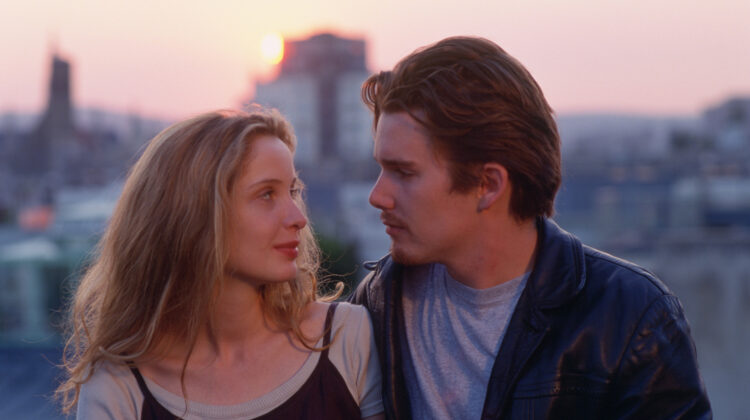“If there’s any kind of magic in this world … it must be in the attempt of understanding someone, sharing something. I know it’s almost impossible to succeed … but who cares, really? The answer must be in the attempt.”
Richard Linklater’s 1995 romance (but not completely romance) film captures the essence of conversation. The film’s 30th anniversary gives an excuse to explore the incredible work that is “Before Sunrise.” The premise follows two strangers who meet-cute on a train in Austria. They begin talking, and conversation flows like a strange miracle, moment to moment, no wasted word or second in the 101-minute runtime.
These strangers just happen to be Jesse (Ethan Hawke), an American traveler on his way to Vienna for the cheapest flight home, and Céline (Julie Delpy), a French student on her way back to Paris. But time is the worst enemy as the train stops in Vienna, when Jesse suggests a crazy idea: Why doesn’t she get off the train with him in Vienna, and they can be together until he catches his plane? And thus a movie is born.
To begin with, there is no plot. The film relies heavily on the screenplay cowritten by Linklater himself, and Kim Krizan carries a film like no other. They just … talk. There is no hidden agenda; there are no unnecessary betrayals; there is no phony violence. It’s just a conversation between the two characters about everything and nothing from mid-afternoon to the following dawn. Everything and nothing is a stretch, as the two discuss topics such as parents, death, love, former boyfriends and girlfriends, music and a 365-day cable access television show following the mundane lives of random people throughout the world. But that’s the beauty of the film, the mundane lives and stories each individual holds. The film feels so real because it’s almost like Jesse’s ridiculous show – their stories all seeping into each individual audience member’s life and memories and transporting them into those memories.
It’s odd to write this review 30 years after the film’s original release, considering Jesse suggests their time together could be seen as time travel. He asks Céline to envision a future where she has a boring husband and wonders “what would some of those guys be like that I knew when I was young,” and essentially, she’s given the opportunity to rewrite her life. Now I sit here looking back at the film, essentially time traveling, watching love unfold before my eyes and wondering about the infinite possibilities.
To me, there is no better film that captures the euphoria of meeting someone new, much less a romantic partner. That split second of time when you realize a connection with another living human is the greatest indescribable high in the world. It is a privilege to watch Linklater’s directing follow (not too closely but close enough to feel part of the conversation) Hawke’s and Delpy’s characters.
In one of Céline’s monologues, she describes the importance of love to her: “Isn’t everything we do in life a way to be loved a little more?” This fundamentally asks the question: Why do we love? It seems that any sort of account of love must answer this justificatory question. Many have tried to answer the question, ranging from Aristotle to Sartre to even myself (my opinion being least valuable). But the film seems to say that love lies in these minute connections made with another individual and all the beauty and pain that comes with it.
—
Featured image via Warner Bros.

